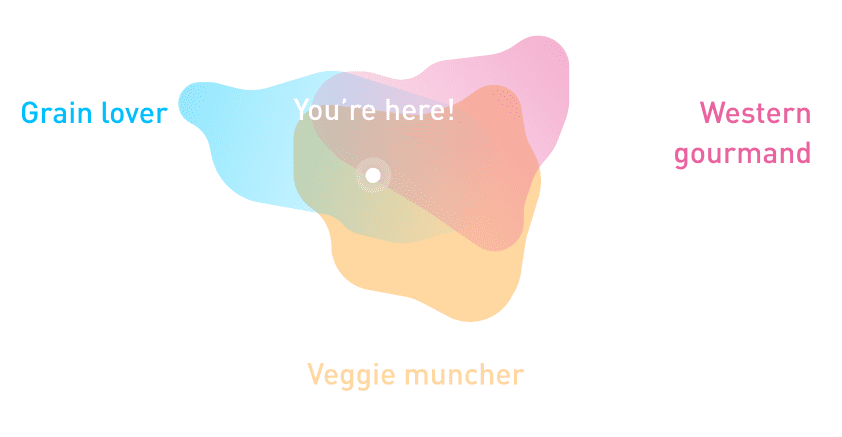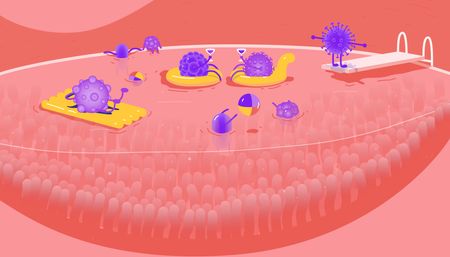Microbiome types are based on the predominant bacterial community living in your gut. These clusters are most likely influenced by long-term eating habits, as well as pharmaceutical drugs like antibiotics according to research.
Welcome to level two of our journey into the different types of the human microbiome. If you missed the first part of this exploration, click here to check out part one, or catch up with the important points below:
- Microbiome types are clusters of dominant bacterial communities.
- Long-term diet and drugs are believed to have the most influence.
- Prevotella-dominance is associated with carbohydrate consumption.
- Meat-eating is linked to a strong representation of Bacteroides.
- Traditional rural diets are represented by several microbial species.
- Age, gender and body mass don't appear to influence microbiome type.
- Regular microbiome tests can reveal long- and short-term dietary changes.
It is entirely possible to speculate what microbiome type you are by studying your long-term diet - if you can survive the horrified looks of microbiome biostatisticians and medical professionals around the globe.
Diversity is the key to health, because it means that different types of bacteria can perform different roles.
But it’s essential to remember that nothing beats the 16s rRNA sequencing technology used by Atlas Biomed and other companies offering similar services. Why? Because we actually DNA test your stool sample to identify microbial diversity and abundance, including rare and hard-to-detect species. Much more accurate than eyeballing it, right?
☝️DISCLAIMER☝This article is for informational purposes only. It is not intended to constitute or be a substitute for professional medical advice, diagnosis, or treatment.
Microbiome enterotypes and diet
There are three main dietary choices that distinguish these groups, helpfully denominated by Atlas Biomed as the Veggie Muncher, the Western Gourmand and the Grain Lover.

🥦 Veggie munchers
This type is dominated by Prevotella bacteria that have a strong preference for tough-to-digest dietary fibre and resistant starches of plant origin. These food sources make it to the Veggie Muncher’s large intestine because the body lacks the tools to break fibre down.
Prevotella feast on dietary fibre and resistant starches, producing vitamins and short-chain fatty acids in exchange for this sustenance. This cluster has been identified in tribes of Africa and South America, as well as in vegetarians and obese people.
Wait a second - obesity?! That’s right. As surprising as it may sound, Prevotella bacteria also delight in refined carbohydrates like sweets and pastries, and have been detected in the microbiomes of obese patients… Just going to show that bacteria are surprising and adaptive creatures, just as much dedicated to survival as humans.
🍔 Western gourmands
Grain-lovers, veggie munchers and the French may be offended by the use of “gourmand” in this category name - and it is up for debate whether a diet of meat and animal fats, as well as Western food choices like fast-food and refined carbohydrates constitutes “gourmandise”.
Bacteroides dominate in this cluster (up to 80% of the ecosystem), due to their love of animal protein and fats, and it has been suggested that their abundance may indicate a lack of diversity. Diversity is the key to health, because it means that different types of bacteria can perform different roles, and take over from each other if something happens, or one species dies out. Other bacterial types identified include bile-resistant Parabacteroides, Paraprevotella and Odoribacter.
Tread carefully in your opinions about this type, because Western Gourmands are subject to the same controversy as Veggie Munchers! That’s right, human members of this cluster exist on a rainbow scale from the Paleo crossfitter who eats only grass-fed beef and wild cranberries from Scandinavia to the man who can eat the world’s biggest burger in one sitting (a whole 1,974 lbs of Western gourmandise).
🌽 Grain-lovers
Microbiomes in this cluster reflect a preference for grains (think porridge, barley, oats, etc.) and other foods that are rich in hard-to-digest fibre. Their diet is not a smorgasbord of international delights, but rather a salute to the diets of rural communities raised on food from their gardens and fields.
Originally identified in the first landmark paper by M. Arumugam as being dominated by Ruminococcus in 2011, further research has revealed that it is composed of several dominant bacterial genera (classification of bacteria) including Eubacterium, Dorea, Ruminococcus, Anaerostipes, Blautia, unclassified Lachnospiraceae and, to a lesser extent, Collinsella. Increased representation of Firmicutes indicates that hosts are probably good at producing butyrate, a short-chain fatty acid with anti-inflammatory properties.
Stool on display
One of the more entertaining aspects of microbiome analysis is its ability to trade in topics of biological taboo, and bring us closer to a prerequisite of human existence: faecal matter. Yes, that’s right. Poo - an essential human property that attracts an ambivalent mixture of curiosity and disgust.
Thankfully, a team of stoic researchers with fearless lab assistants delved into the visual detection of types by stool consistency and discovered some relevant details. They decided to compare the organic refuse of their study’s participants using the Bristol Stool Chart (BSS) to their microbiome test results. By doing so, they discovered that the softness or hardness of your stool is associated with the bacterial composition of your gut microbiome.
Prevotella feast on fibre, producing vitamins and short-chain fatty acids in exchange for this sustenance.
This is because the texture of your stool is influenced by many factors including water content, microbiome activity and transit time (i.e., how long it takes to travel from entrance to exit). In short, faster travel is correlated with loose stools (fluffy appearance), and slower transit with harder stools (smooth contours, dense material)
Hosts with prevotella-dominant microbiomes tend to experience faster colon transit times with loose stools, while those dominated by Ruminococcus and Bacteroides were associated with harder stools and longer transit. However, stool dominated by Bacteroides alone were also looser, when compared the stools with a combination of Bacteroides and Ruminococcus. This is according to a study of 53 women aged 22-50 as part of the Flemish Gut Flora Project.
So what’s your microbiome type?
If you’ve made it this far, you have probably already surmised whether you are a member of the Veggie Munchers, the Western Gourmands or the Grain Lovers… But let’s be honest, nutrition-related science has a big problem: humans lie. It’s true.
We don’t just lie to scientists about what we eat, we lie to ourselves. We underestimate caloric intake, we forget things we’ve eaten, we overestimate how many servings of vegetables we’ve had. So if you really want to know your type, take the Atlas Microbiome Test.
☝Discover your microbiome type☝ Take the Atlas Microbiome Test and get 10% off when you sign up to the blog
☝️ Remember
1. There are three main microbiome types.
2. Prevotella-dominant clusters are linked to looser stools and carb-rich diets.
3. Bacteroides was associated with lower diversity and variable stool consistency.
4. Ruminococcus/Bacteroides combinations had hardest stools/slowest transit.
5. In every group, hosts make healthy and unhealthy dietary choices.
6. The only way to identify your type is by 16s rRNA sequencing.
- Manimozhiyan Arumugam, Jeroen Raes, et al. Nature volume 473 (12 May 2011), Enterotypes of the Human Gut Microbiome.
- Gary D. Wu, Jun Chen, et al. Science Vol. 334 (07 Oct 2011), Linking Long-Term Dietary Patterns with Gut Microbial Enterotypes.
- Vandeputte D, Falony G, Vieira-Silva S, et al. Gut (2016), Stool consistency is strongly associated with gut microbiota richness and composition, enterotypes and bacterial growth rates

















